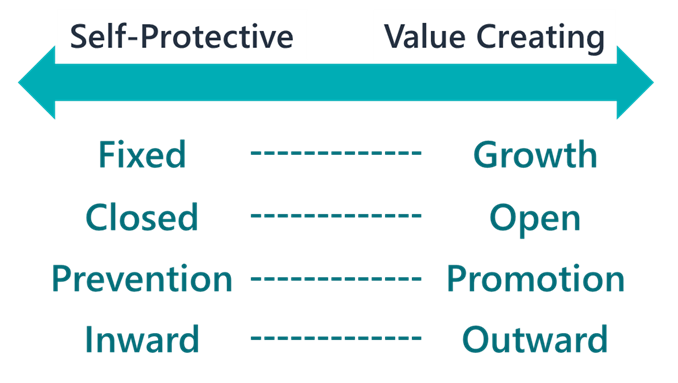After people take my FREE Personal Mindset Assessment, it is common for me to receive an email that says something along the lines of, “The assessment said that I have a fixed mindset, but I DO NOT have a fixed mindset.” Then, they often will give several examples about how they have taken on a challenge and grown because of it.
Did you have any similar feelings when you took the Personal Mindset Assessment?
If so, this article is for you.
Let’s try to get in deeper touch with our mindsets. For, if we can do so, we will become more able and empowered to elevate our mindsets.
My Mindset Framework
To set the stage for the information that is to come, let me remind you of my mindset framework, covering four different sets of mindsets:

The content below relates to all four sets of mindsets.
Remember, Our Mindsets Are Neural Connections
Our mindsets are neural connections in our brain that perform three jobs:
- They filter information into our brain from our body/senses
- They interpret that information in a particular way
- They activate our body’s response to the information taken in and how it is interpreted
We don’t have a growth mindset neural connection OR a fixed mindset neural connection. Instead, we have both a growth mindset neural connection AND a fixed mindset neural connection.
Generally, one of those neural connections is stronger than the other. This means that it fires more readily and rapidly, making it our default mode of processing. But, that doesn’t mean we can’t use the weaker neural connection, we just have to activate it first, usually through intentionality.
How We Fake Ourselves Out About the Quality of Our Mindsets
When we are in a state of low stress and high stability, it is easier to activate and turn on our value creating mindsets, even if those aren’t our default mindsets.
For example, if I have a dominant fixed mindset, this means that I am currently wired to avoid taking on challenges where I am not sure I will be successful, which prevents me from learning and growth.
But if I am in a situation where I feel safe to experiment and have little stress, I may be willing to activate my growth mindset and try to do something we normally wouldn’t do.
This leads to situations where people who have a dominant fixed mindset can point to times where they have taken on challenges and have grown from them.
For example, one client I work with has a fixed mindset at work, but at home, he has started learning how to play the guitar.
Getting In Touch with the True Quality of Our Mindsets
If we want to get a deeper read on the true quality of our mindsets, we need to consider how we are prone to operate, not in times of peace, but in times of stress.
Consider the following scenarios. When you are in a stressful situation and:
- You are invited to take on a new challenge where there is the possibility you might misstep or fail and look bad, are you more inclined to (a) avoid that challenge (fixed) or (b) approach that challenge (growth)?
- You are presented with information that you might be wrong or not thinking correctly, are you more inclined to (a) stand strong in your position (closed) or (b) become open to the possibility that you might be wrong (open)?
- There is the possibility for problems to occur, do you (a) seek to obtain more control to avoid problems (prevention), or (b) keep your eyes on the bigger purpose without necessarily seeking any more control than normal (promotion)?
- You feel like you might be squeezed out of the situation, will you (a) protect your position and defend your turf (inward), or (b) consider stepping back if it will help the team/group/org better create value for others (outward)?
If you said “a” in any of those situations, that is natural. But, it is also reveals your self-protective tendencies.
These self-protective tendencies are justifiable because they keep us safe in the moment, but they also hold us back from:
- Learning and growing (the benefit gained from having a growth mindset)
- Finding truth and thinking optimally (the benefit gained from having an open mindset)
- Reaching goals and/or fulfilling a purpose (the benefit gained from having a promotion mindset)
- Lifting others (the benefit gained from having an outward mindset)
Conclusion
If we want to become a better leader and a more positive influence, it is vital that we fully awaken to the current quality of our mindsets. When we find mindsets that are less than ideal (fixed, closed, prevention, inward), we also get clarity on what mindsets to focus on in our development efforts (growth, open, promotion, outward).
To awaken to your mindsets, take my Personal Mindset Assessment & explore if it accurately reveals your current mindsets. Remember: our mindsets are generally revealed in how we are wired to operate in times of stress.
If you want to elevate your mindsets, check out my books:
Or purchase a mindset development package.
And, if you want to help your team elevate its mindsets, let’s connect.










